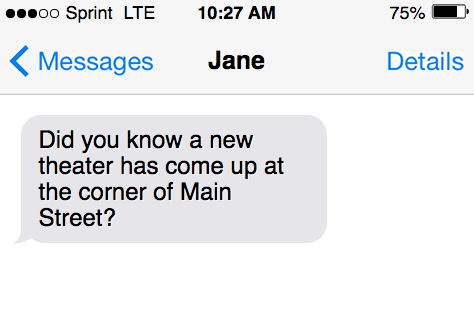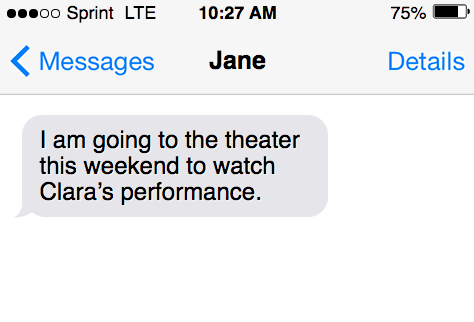What is the difference between the words “theater” and “theatre?” Why is it common to see both of these words in American English? Do they hold the same meaning? It can get confusing to see both words appear in literature, news articles, and other written references.
Learn what “theater” and “theatre” mean in this short grammar guide…
What does “theater” mean?
A theater is a room, building, or outdoor structure where dramas, plays, and films are presented before an audience. The origin of this word comes from the Greek word ‘theatron’, which is translated to a ‘place of seeing.’
The concept of a theater originated during the time of the Greeks. Actors in wagons performed the original plays. It would be held in the marketplace or agora. The audience would be seated in stands made of wood. It is believed that theaters first originated in 534 BCE.

The Romans improved on this concept and first brought out the concept of an elevated stage for the performers. The audience was seated on benches in a semi-circular fashion. This was the precursor to today’s modern theaters. While the theater was initially used for dramas and plays, later on, it was used for musical performances.
The cinema, where a movie is shown, is also referred to as a theater since it has the same arrangement. The theater is a place where people assemble to watch something.
| Word | Definition |
| Theatre (noun) | a building or outdoor area in which plays and other dramatic performances are given. |
| Theater (noun) | a building or outdoor area in which plays and other dramatic performances are given |
What does “theatre” mean?
The word “theatre” has the same meaning as “theater.” It is a place where people can see a drama, play, film, or performance.
The only difference between “theatre” and “theater” is in the spelling. Otherwise, both mean the same things and originated from the same Greek word.
Why are they different spellings?
The difference between theater and theatre represents the difference between American English and British English. The English spellings followed in America differ from that of the British. The origin of this goes back to the days after the American Revolution. Once the British left America, the language being used got rewritten in many ways.
One of the pioneers who worked on this was Noah Webster. He created a new dictionary where he Americanized words to make them suitable for the American context. In particular, he focused on ensuring words were spelled as they were pronounced in North America. He made changes to spelling and punctuation. The result was a dictionary that is followed today.

Different spellings
American English is followed in the US and most parts of Canada.
It’s also followed in parts of the Caribbean.
An important thing to note is there is no significant difference between American and British English. Spellings are a majority of what differ. For example, in British English, the word “colour” is used.
In American English, the ‘u’ is removed, and the word is spelled as “color.”
Either of the two words can be used, and both are correct. It is just a question of which form of English you follow.
Coming back to the topic of “theatre” and “theater”, the word “theatre” is British English. In American English, it is spelled as “theater.”
Both words mean the same, have the exact origin and are pronounced the same. The only difference is in the spelling.
The etymology of “theatre”
The word “theatre” originates from a Greek word called “theatron”.
The Greek work means a place of seeing. It refers to a place where people can see a performance.
The word theatre was used since most people preferred the French style of spelling with words ending in ‘re.’
Even Chaucer used to spell it as theatre. It is the British way of spelling this word.
The etymology of “theater”
The word “theater” is the same as “theatre.”
There is no difference in the origin of this word or its meaning.
The only difference is in how it is spelled, where the ‘re’ is replaced by ‘er.’
The origin of the word is the same Green word “theatron”.
Interestingly, Shakespeare used to spell the word “theater.”
When to use “theater”
In American English, “theater” refers to a place where people assemble to watch a film, drama, or performance. When referring to this place, use the word “theater.”
Examples in sentences
- Did you know a new theater has come up at the corner of Main Street?
- I am going to the theater this weekend to watch Clara’s performance.
- It is so sad to know the theater building has been sold and will be replaced by a mall?
How to remember which form to use
Use the word “theater” when writing in American English. If your audience is people in the US, North America, and Canada—use the word “theater.”
When writing for a British audience or people in India, Australia, South Africa, Singapore, and other countries of the Commonwealth, use “theatre.”
Both words can get used, and they mean the same.
Is it “movie theatre” or “movie theater”?
It depends on whether you are using American English or British English. If you are using American English, you will use “movie theater,” or else you can use “movie theatre.”
Is it “musical theatre” or “musical theater”?
“Musical theatre” is the correct spelling to use when you are writing in British English.
When writing for an audience from Britain, India, Australia, and other countries following British English use “musical theatre.”
When writing for an American or Canadian audience, you can use “musical theater.”
Sources
- Theater and Theatre – How Is It Spelled?
- Theatre vs. Theater: What’s the Difference?
- Theater vs. Theatre: What’s the Difference?
- theatre | definition
Inside this article
Fact checked:
Content is rigorously reviewed by a team of qualified and experienced fact checkers. Fact checkers review articles for factual accuracy, relevance, and timeliness. Learn more.
Core lessons
Glossary
- Abstract Noun
- Accusative Case
- Anecdote
- Antonym
- Active Sentence
- Adverb
- Adjective
- Allegory
- Alliteration
- Adjective Clause
- Adjective Phrase
- Ampersand
- Anastrophe
- Adverbial Clause
- Appositive Phrase
- Clause
- Compound Adjective
- Complex Sentence
- Compound Words
- Compound Predicate
- Common Noun
- Comparative Adjective
- Comparative and Superlative
- Compound Noun
- Compound Subject
- Compound Sentence
- Copular Verb
- Collective Noun
- Colloquialism
- Conciseness
- Consonance
- Conditional
- Concrete Noun
- Conjunction
- Conjugation
- Conditional Sentence
- Comma Splice
- Correlative Conjunction
- Coordinating Conjunction
- Coordinate Adjective
- Cumulative Adjective
- Dative Case
- Determiner
- Declarative Sentence
- Declarative Statement
- Direct Object Pronoun
- Direct Object
- Diction
- Diphthong
- Dangling Modifier
- Demonstrative Pronoun
- Demonstrative Adjective
- Direct Characterization
- Definite Article
- Doublespeak
- False Dilemma Fallacy
- Future Perfect Progressive
- Future Simple
- Future Perfect Continuous
- Future Perfect
- First Conditional
- Irregular Adjective
- Irregular Verb
- Imperative Sentence
- Indefinite Article
- Intransitive Verb
- Introductory Phrase
- Indefinite Pronoun
- Indirect Characterization
- Interrogative Sentence
- Intensive Pronoun
- Inanimate Object
- Indefinite Tense
- Infinitive Phrase
- Interjection
- Intensifier
- Infinitive
- Indicative Mood
- Participle
- Parallelism
- Prepositional Phrase
- Past Simple Tense
- Past Continuous Tense
- Past Perfect Tense
- Past Progressive Tense
- Present Simple Tense
- Present Perfect Tense
- Personal Pronoun
- Personification
- Persuasive Writing
- Parallel Structure
- Phrasal Verb
- Predicate Adjective
- Predicate Nominative
- Phonetic Language
- Plural Noun
- Punctuation
- Punctuation Marks
- Preposition
- Preposition of Place
- Parts of Speech
- Possessive Adjective
- Possessive Determiner
- Possessive Case
- Possessive Noun
- Proper Adjective
- Proper Noun
- Present Participle
- Prefix
- Predicate



